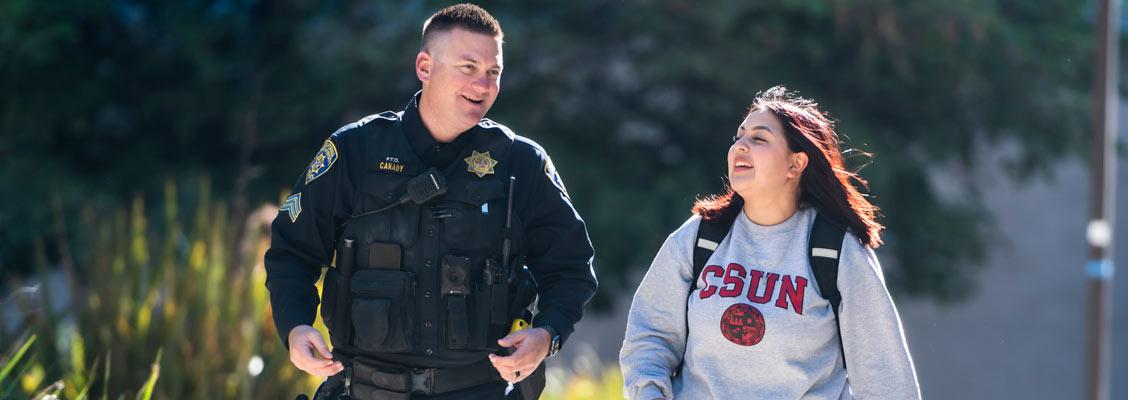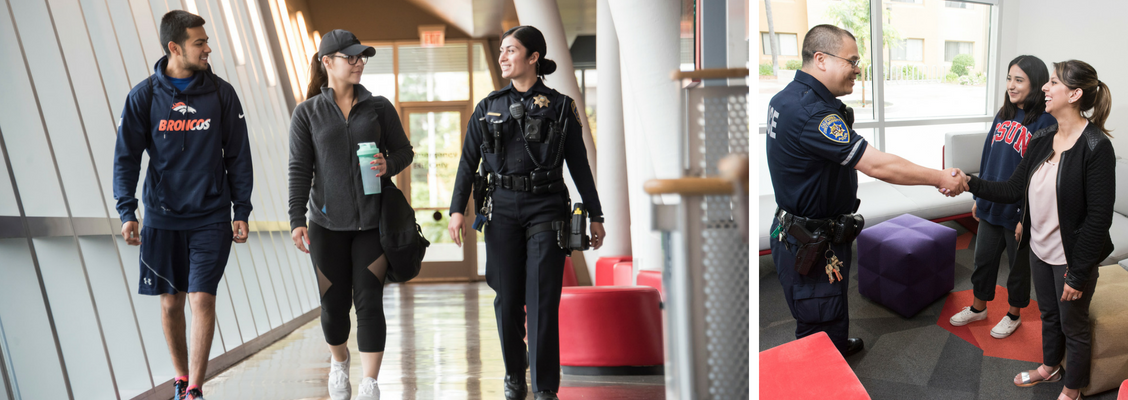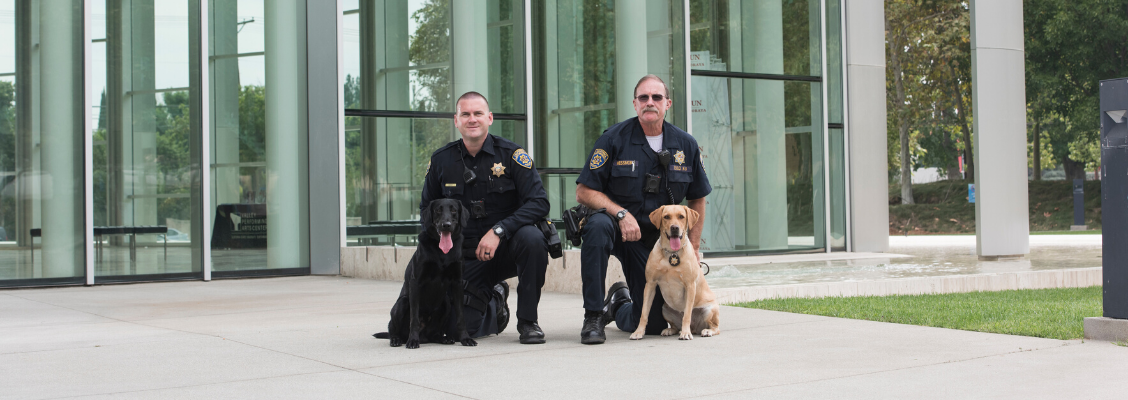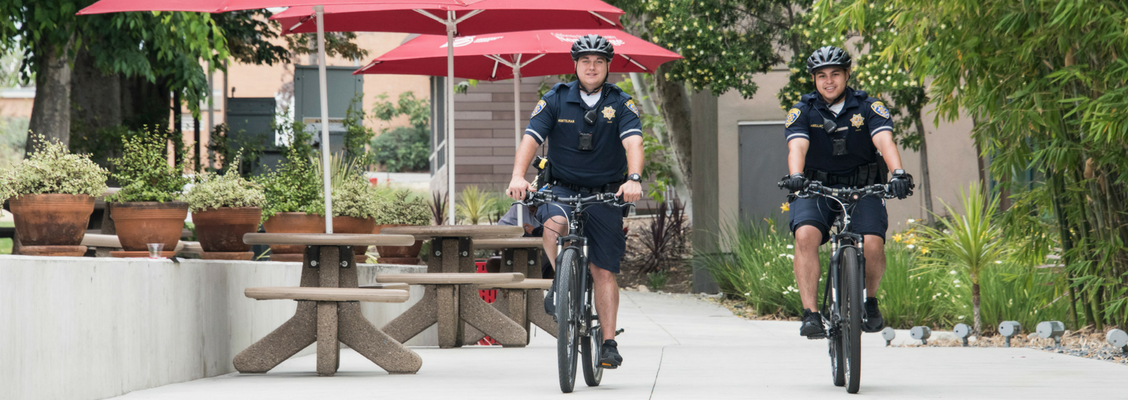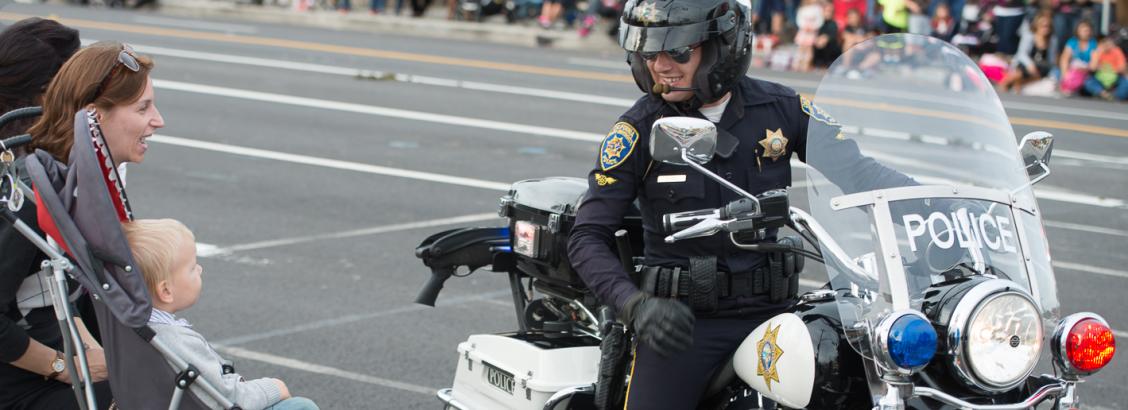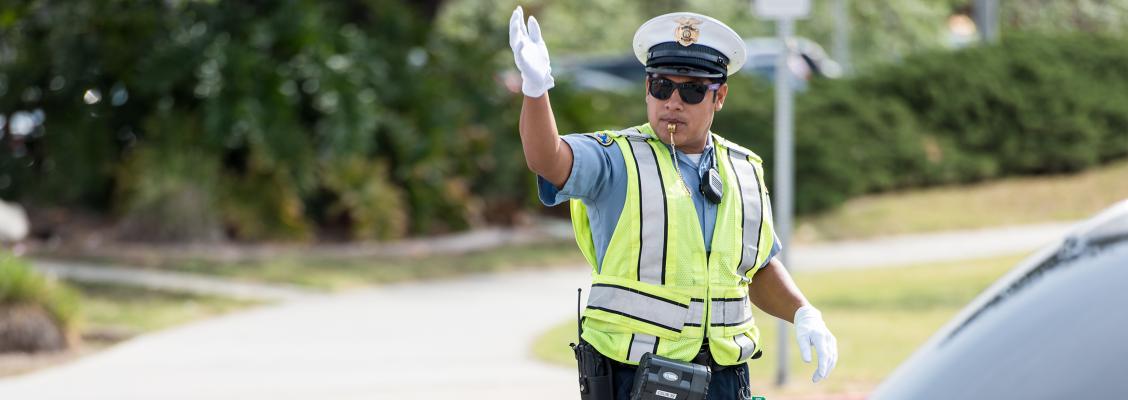Read and Practice the Following Table of Contents
What to do in the Moment of Confrontation
Personal Weapons
Vulnerable Areas
How the CSUN Police Department Can Help You
The Role of a Rape Crisis Advocate
What to Expect During Your Visit to the Medical Facility
Reporting an Incident: Law Enforcement Viewpoint
What to Do if You are Raped or Sexually Assaulted
Help a Friend
Resources Available to You
The Court Procedure
Sexual Violence Prevention Committee
WHAT TO DO IN THE MOMENT OF CONFRONTATION
At the moment of confrontation, no “expert” will be there to answer the victim’s question. A specific maneuver that may work well for one victim will not necessarily work for another. The major reason for this is that there is no one classification for the rapist. His physical features and psychological make-up cannot be stereotyped. His characteristics are as varied as those of his victim.
Generally, alternatives for resistance to rape are divided into two categories: passive resistance and aggressive resistance. In cases of stranger rape, there is a great emphasis on passive resistance as an initial response. The goal of passive resistance is to think and talk your way out of a situation. Your own instinct and ingenuity will be your guide. If this method fails, you will probably not have increased the risk of physical harm to you. This is based on the premise that the attacker may be armed and that he is acting out feelings of rage and hostility. If the victim reacts violently, it may only serve to increase the violence and brutality of the assault.
Interestingly, statistics on acquaintance rape are indicating that aggressive resistance is often a more successful approach. If the attacker is unarmed and has no accomplice, some studies indicate that screaming (or otherwise making a scene and calling attention to your situation) and fighting back, deter rape. Key factors in this response are speed and decisiveness of the victim’s response.
Aggressive tactics are designed to frighten off an assailant. Such resistance may include karate or judo techniques or simple techniques as taught in R.A.D. classes, as well as the simple street fighting tactics of scratching or kicking. The victim’s choice of tactics will depend on her physical capabilities or limitations and on how she views her attacker. The victim is the only person who can gauge the situational factors and sense the attacker’s level of violence. Given this, the victim’s response will be selected instinctively rather than methodically.
If you decide to attack your assailant, you want to strike a vulnerable area of the body and make your attack count. You can’t fight halfheartedly. This requires choosing the moment of attack carefully – preferably when your assailant drops his guard for a moment. Since most men are larger and physically stronger than women, the chances of a woman overpowering the man are unlikely. Undirected hitting or flailing at your assailant is not an effective response. Instead, a woman needs to know vulnerable areas of the body and strike at the weak points. Your weapon could be a set of keys, any hard object or your own personal weapons (i.e. your fist, elbow, etc.).
Taking the CSUN PD’s R.A.D. class can assist in understanding your options when faced with assaultive behavior.
PERSONAL WEAPONS
These are the parts of the body which can be used for self-defense and counterattack. Developing skill in the use of your personal weapons should enable you to successfully defend yourself when attacked.
The Head – The front and back of the head are quite substantial and can be used for butting.
The Hand – When using the hand as a weapon, the wrist should be held straight for all blows except the “heel-of-hand” blow. In addition to regular “closed-fist” blows, you can strike with the “edge-of-hand” and the “edge-of fist.” These two blows are most effective when delivered with a chopping motion from across the body (from the inside to the outside) with the palm down, or downward with the palm facing in. Blows delivered from across the body permit the use of the large trunk muscles. When used correctly, these muscles add considerable speed and force to the blow. The “heel-of-hand” blow is delivered upward when you are close to your attacker. The fingers must be flexed slightly and held rigid for the “finger-jab.” The “extended-knuckles” blow requires the thumb to be held firmly against the index finger, thereby helping to “firm-up” the hand.
The Elbow – When used as a weapon, the elbow should be fully flexed. The most effective blow is delivered toward the rear. This is probably the most powerful blow the average person can deliver.
The Knee – “Knee-lifts” to the face and groin can be very effective when executed properly. The knee should be flexed fully by pulling the foot back as close to the buttocks as possible, as the knee is raised. The “knee-lift” and all other kicks must be executed quickly, followed by an immediate return to a strong, balanced position.
The Foot – The toe of the foot is used in kicking forward; the edge, ball and heel are used side ward. The ball and heel are used in kicking backward, and the heel is used in stomping. To execute a kick properly, you must first flex the hip. This is accomplished by raising the knee until the thigh is parallel to the floor. The lower leg is then “snapped” or “thrust” out to complete the kick. A short, snappy kick using the forward foot is extremely effective when directed against the opponent’s shin, knee, or groin.
VULNERABLE AREAS
The human body has many vulnerable areas. Blows, kicks, or pressure directed at or applied to these areas may cause pain, disablement, unconsciousness, and even death. The most vulnerable areas of the body are located on or near the “midline,” the imaginary line that bisects the body. Blows delivered to this “midline” area, either front or back, generally have a much greater effect than blows which are delivered elsewhere.
Knowing where to strike blows and where to apply pressure is just as important as knowing how to strike the blows and how to apply the pressure. As a rule, the untrained person will direct his blows to his opponent’s head or face. This is the exact place most people expect to get hit and, as a result, this is the area they intend to protect. In protecting the head and face, most individuals forget about protecting the large areas of the trunk. The trunk contains many vulnerable areas, and it is much more difficult to protect than the head and face. This is due largely to the fact that it is a much bigger area and hence easier to hit, and also because it is very difficult to avoid blows aimed at the trunk without moving the feet. Blows aimed at the head and/or face can be avoided rather easily by ducking the head, and this action does not require moving the feet.
As a general rule, a counterattack should not be directed to the opponent’s head and face, but to the “midline” area of the trunk, such as the liver, solar plexus, pit of stomach, floating ribs, the soft tissue area of the abdomen, or the groin.
Developing your skills in the use of personal weapons helps build confidence and success in defending yourself when attacked. Like any other skill, practice makes perfect. The first step is a good introductory course in basic self-defense. California State University, Northridge has a specialized course for women only called Rape Aggression Defense (R.A.D.). It stresses awareness, prevention, risk reduction and avoidance while progressing on to the basics of hands-on defense training. Call the Crime Prevention Unit at (818) 677-7922 for the class schedules.
HOW THE CSUN POLICE DEPARTMENT CAN HELP YOU
Because rape is a serious offense, people often think of turning to the police for help. The California State University, Northridge Police Department have specially trained officers who can help you with a rape complaint. The officer’s immediate concern will be your emotional and physical well-being. If you require emergency medical assistance, you will be taken to the nearest medical facility for support. If you are sure you wish to take your complaint before a court of law, there are structured steps which the police will follow in the investigation (also see “The Court Procedure” later in this booklet.) If you are not sure, you may just want to discuss the situation and your options. The university police can provide you with advice in a strictly confidential manner without your feeling obligated to go to court. Alternative means of presenting your complaint will also be discussed with the ultimate choice left up to you.
Specially trained officers are available 24 hours a day for all complaints of rape, sexual assault or harassment. They can provide you with informal advice in a confidential manner or guide you with a formal complaint. Additionally, the department has an in-house Rape Crisis Advocate who can help you through the investigatory process. The primary responsibility of a rape crisis advocate is to provide emotional support during the law enforcement investigation and to facilitate communication between law enforcement officers, medical personnel and the victim.
The advocate can be made available to be present at many stages of the investigation, at a level that the victim is comfortable with. If an advocate is declined, the victim may opt to have a friend or family member present.
The following is a quotation taken from interviews as published in Men On Rape:
“…When you see a girl walking around wearing real skimpy clothes, she’s offending you and I guess rape would be a way of getting even. If I’m on a date and a girl’s dressing sexy and acting sexy, why doesn’t she want to have sex? The whole time you figure she’s going to say yes because she’s teasing you, and all of a sudden she switches because she’s going to save it for marriage or something. That’s not right. She shouldn’t have led you on in the first place….”
Taking the CSUN PD’s R.A.D. class can assist in understanding your options when faced with assaultive behavior.
The university police department wants you to report crimes of rape and sexual assault.
In turn we pledge:
- We will meet with you privately, at a time and campus location of your choice, to take your report. We will treat you and your situation with courtesy, sensitivity, dignity, understanding and professionalism. We will have a female officer available upon request whenever possible.
- Our police officers will not prejudge you, and you will not be blamed for what occurred. If you are not sure if you wish for your case to go forward towards prosecution of your assailant, you may explore your options and decide at a later time. You are not obligated for prosecution of your assailant simply because you have reported the crime to the university police.
- We will assist you in obtaining hospital treatment or other medical needs. We will assist you in contacting campus counseling services and arrange for emergency housing if need be.
- We will contact the Valley Trauma Center for sexual assault services, to provide you with a counselor if you wish.
- We will fully investigate your case and will help you to achieve the best outcome.
This may involve the arrest and full prosecution of the suspect responsible. You will be kept up-to-date on the progress of the investigation and/or prosecution.
- We will continue to be available to answer your questions, to explain the system and process involved (prosecutor, courts, etc.), and to be a listening ear if you wish.
- We will consider your case seriously, regardless of your gender or the gender or status of the suspect.
- If you prefer, you may contact the Valley Trauma Center’s 24-hour hotline at (818) 886-0453 or (661) 253-0258 for anonymous and confidential discussion with a trained rape crisis advocate.
THE ROLE OF A RAPE CRISIS ADVOCATE
In accordance with section 264.2 of the California Penal Code, the services of a rape crisis advocate must be offered to all sexual assault victims. This offering is made during the officer’s initial investigation when information is being gathered. The CSUN Police Department has a rape crisis advocate on staff that is available when requested. Additionally, the Valley Trauma Center has rape crisis advocates who can provide assistance. The primary responsibility of a rape crisis advocate is to provide emotional support, at a level the victim is comfortable with, during the law enforcement investigation and to facilitate communication between the police officers, medical personnel and the victim. The advocate can also accompany the victim to the medical facility if a forensic exam is needed. The purpose of a medical exam is to collect forensic evidence and treat injuries. Whether or not you choose to move forward with prosecution of your assailant, it is important to collect forensic evidence within 72 hours of the assault.
The following is a quotation taken from interviews as published in Men On Rape:
“I used a little bit of force once where I overpowered a woman. She didn’t mind it after it was over. If she’d started crying or something I would’ve stopped. A lot of it depends upon the situation. If you’re with a girl and you’re drunk and she’s teasing you and leading you on and on and at the end she says, “No!” – well, if a guy’s real drunk, he’s gonna lose control and go after her…”
55% of female students and 75% of male students involved in acquaintance rape had been drinking or using drugs at the time...
WHAT TO EXPECT DURING YOUR VISIT TO THE MEDICAL FACILITY
While at the medical facility, a sexual assault nurse examiner will interview you to get an account of what happened before, during and after the assault. Next, the nurse will perform a forensic examination to evaluate injuries and collect physical evidence. Not all injuries are visible, so an exam will allow for not only trace evidence to be collected, but for photographs to be taken using a high-magnification camera.
The exam is similar to a gynecological examination. Once the exam is finished, the evidence will be packaged up by the nurse and turned over to the CSUN police department for processing. In the event your clothes are kept as evidence, the nurse will provide you with a fresh change of clothes to wear home. The nurse may also provide you with preventative medication for pregnancy and sexually transmitted diseases. The advocate accompanying you to the medical facility will provide you with literature about where you can seek short and long-term care.
REPORTING AN INCIDENT: LAW ENFORCEMENT VIEWPOINT
It is important to report an attempted or completed attack or suspicious activity you have experienced or witnessed. This is of crucial importance in helping the police find the assailant and protect you and the CSUN community. The Department of Police Services is available to assist students and staff 24 hours a day. The Department has experienced, trained and sensitive female and male officers specializing in dealing with issues such as sexual assault and rape.
If a victim does not want to press charges against an assailant, she/he has two other options available for reporting the attack:
- The victim can make a report to the police. An officer will take the victim’s statement and the process can end there. In this case, the police will not further investigate and attempt to apprehend the assailant.
- An “anonymous report” can be filed with the university police. This would involve having you or another person (a third party) make a report of all the details of the assault to the police. The victim remains anonymous. It is important to note that no judicial action can be taken against the rapist in an anonymous report; this information is used for police purposes only. Anonymous report forms are available from the CSUN PD website at http://www-admn.csun.edu/police/forms/sexual_assault.htm.
Perpetrators of rape are frequently repeat offenders. Capturing them and having them brought to justice is important. This is true for both the date/acquaintance rapist and the stranger rapist.
WHAT TO DO IF YOU ARE RAPED OR SEXUALLY ASSAULTED
- Go to a safe place. If you choose to report the assault, call the police.
- Preserve all physical evidence of the assault. Do not shower, douche, brush your teeth or change your clothes. Save all the clothing you were wearing at the time of the assault.
- Contact someone for help and support. A friend, family member or someone else you trust and ask them to stay with you. If you are a CSUN student, the police department’s in-house rape crisis advocate can provide support. Remember, the Klotz Student Health Center and University Counseling Services provide urgent-care and walk-in appointments.
- Go to a hospital for medical care. A specialized forensic clinic that provides medical care for sexual assault victims can conduct a physical exam. Even if physical injuries are not obvious, or it has been several days since the assault, you should seek medical care.
- If you choose not to go to the police immediately, write down all the details of the assault and save them in case you wish to report it at a later time.
- For both short- and long-term care, seek assistance from the resources listed in this booklet.
HELPING A FRIEND
Many victims are reluctant to tell anyone about the assault, even their closest friends. A friends’ support can be helpful in helping the victim cope with the traumatic experience and long-term help. Here’s what you can do:
- Be prepared to listen and believe what you are being told. Many victims do not disclose their experience because they feel ashamed and/or fear that they will not be believed. It takes a great deal of courage to talk about sexual assault; let your friend tell you what happened at a level she/he is comfortable with.
- Don’t pass judgment or blame your friend. Make it clear that you know your friend was not responsible in any way for the sexual assault, regardless of the circumstances. For example, if your friend was intoxicated, she/he is not to blame.
- Encourage your friend to make her or his own decisions and choices. Let your friend decide if they want to notify police and file a report, contact a rape treatment/crisis center, or seek medical attention. What you would personally do may be different than what your friend decides to do—and that’s okay.
- Be supportive. Support your friend’s decisions about whom they tell and how to proceed. For example, should they choose to seek medical attention, you can accompany them to the medical facility.
- Encourage your friend to seek short- and long-term care and treatment. The effects of sexual assault often result in long lasting trauma. Professional care can provide a safe, private place to talk about feelings and concerns so that they are not holding back from enjoying their lives and participating fully in relationships with others.
- Protect your friend’s privacy. Do not share with others what your friend has told you.
- Let your friend decide whom they wish to confide in.
The following is a quotation taken from interviews as published in Men On Rape:
“…Operating in me was a belief that I was different from other men, that I wouldn't be involved in such things as rape, certainly not; but I shared at the same time the fundamental male feeling, with regard to Judy, for example, that even if she said no, she’d never mean no and that she could be talked out of it. I felt that way about a number of women I related to. I thought of it as persuasion, clarifying of the facts…”
…the majority of acquaintance rape victims are between the ages of 15 and 24...
RESOURCES AVAILABLE TO YOU
There are many resources available to sexual assault victims as well as the friends and family members of victims. Available options include crisis hotlines, immediate and on-going counseling, referrals, and on-line information. Discussing rape, sexual assault or sexual harassment is difficult for anyone, but it is better to talk to someone and seek advice and support rather than silently accept what has happened.
It is particularly difficult to accuse a friend or acquaintance of a sexual assault. It is harder still if you confide in other friends and are told you misinterpreted your assailant’s actions or that you caused the action. Sometimes you need to make use of an impartial, confidential resource to act as a sounding board to help you sort out the confusion which frequently accompanies this type of victimization. The following resources are available to help you, provide you with options for dealing with your concerns and support you in your decision.
On Campus Resources: *For hours of operation, please call or refer to the website for more information
DEPARTMENT OF POLICE SERVICES
At the corner of Darby & Prairie, west of the B3 parking structure (818) 677-2111
http://www-admn.csun.edu/police/assault/
University police officers are specially trained in rape investigation. Additionally, a rape crisis advocate is available on staff and can provide support during the investigative process and medical exam (if applicable) as well as referrals for aftercare. The Department also provides extensive community education programs on sexual assault prevention and offers the R.A.D. program for women’s self defense
http://www-admn.csun.edu/police/RAD/
UNIVERSITY COUNSELING SERVICES
Bayramian Hall Room 520 - (818) 677-2366
http://www.csun.edu/counseling/
UCS provides urgent/crisis and appointment-based counseling, all of which is free and confidential.
KLOTZ STUDENT HEALTH CENTER
Located west of the G3 parking structure, north of Chisolm Hall/NCOD - (818) 677-3666
All services at the Klotz Student Health Center are confidential.
- Emergency Contraception
- HIV testing
- Sexually Transmitted Infection Testing & Treatment
- Pregnancy Options Counseling
- Birth Control Information Sessions
Medical Professionals are mandated reporters. This means that nurses and doctors are required to notify law enforcement if they learn that a student has been sexually assaulted.
There is no charge for basic services at the Klotz Student Health Center for currently enrolled students. Cal State Northridge student fees include a health fee that pays for the basic services provided. Some additional services require a nominal fee.
OFFICE OF THE VICE PRESIDENT FOR STUDENT AFFAIRS
University Hall 310 - (818) 677-2391
http://www.csun.edu/studentaffairs/
Acts of sexual assault are prohibited by the Student Conduct Code. Student victims of sexual misconduct should initiate University disciplinary action if the assailant is a student, faculty or other employee by filing a report with the Associate Vice President/Dean of Students, located in University Hall 310. Please call (818) 677-2391 for assistance.
STUDENT HOUSING & CONFERENCE SERVICES
(818) 677-2160
If you live in on-campus housing, there are many staff who are trained to appropriately refer survivors of sexual assault to law enforcement, advocacy, and counseling resources. Students can contact a Resident Advisor (RA) or Community Director (CD) for help in getting needed support.
HELPLINE (Through University Counseling Services)
(818) 349-HELP
Is a student-run, peer help service operating Sunday through Thursday from 6:00pm to 12:00 midnight and Friday and Saturday 7:00pm to 10:00pm. The Helpline is both a counseling and an information service. Whether you need advice or just someone to talk to, give them a call. All phone calls to Helpline are confidential.
Helpline is staffed exclusively by CSUN students; each night there is at least one female and one male staffer on duty. They are volunteers and not professionals. Thus, Helpline is not a substitute for other counseling services on campus, but rather a supplementary service for students, who may need someone to talk with when these other resources are inaccessible or inappropriate.
Off-Campus Resources:
THE VALLEY TRAUMA CENTER
(818) 886-0453 (San Fernando Valley) & (661) 253-0258 (Santa Clarita Valley)
/eisner-education/strength-united
The Valley Trauma Center operates a 24 hr. crisis hotline, provides accompaniments to medical examination, law enforcement interviews and court appearances as well as provide referrals and prevention education, crisis intervention, and individual and group counseling.
SANTA MONICA RAPE TREATMENT CENTER
(310) 319-4000
http://www.rapetreatmentcenter.org/
The Santa Monica Rape Treatment Center offers comprehensive, free treatment for victims and their families, including 24-hr. emergency medical care, forensic examinations, crisis intervention, long term professional counseling, advocacy, and accompaniment services.
PEACE OVER VIOLENCE RAPE & BATTERING HOTLINE
Locations in Los Angeles, Hollywood and Pasadena (213) 626-3393 (310) 392-8381 (626) 793-3385
https://www.peaceoverviolence.org/
The hotline is a confidential, non-judgmental support service where staff and volunteers are available to provide emotional support, advocacy, information and referrals. The organization also provides accompaniments.
RAPE, ABUSE, INCEST NATIONAL NETWORK (RAINN)
(800) 656-HOPE (4673) – 24 hr. hotline
RAINN hotlines put you in touch with local rape crisis centers. The on-line hotline provides live, anonymous support and works like instant messaging. Victims can talk directly with trained crisis support volunteers via a secure, confidential infrastructure.
CENTER FOR THE PACIFIC ASIAN FAMILY
(800) 339-3940 - 24 hr. hotline
The center provides support to sexual assault and domestic violence victims and is committed to meeting the specific cultural and language needs of Asian and Pacific Islander women and their families.
THE L.A. GAY AND LESBIAN CENTER
(323) 860-5806
Domestic Violence Support Services
The following incident provides an example of acquaintance rape:
”A female student goes to a party and meets an attractive man. They drink, dance and enjoy themselves. He suggests that the loud music prohibits their being able to talk and suggests they go somewhere where it is less noisy. When they go back to his room, she realizes that she is not safe and asks to leave. At that point, he locks the door, holds her down, and rapes her.”
…The attacker can be a college classmate, an old family friend, a neighbor, a professional colleague, a date or other acquaintance...
THE COURT PROCEDURE
Generally in a rape case, the suspect will enter the Criminal Justice System in the following manner:
- CSUN Police detectives will interview both the victim and alleged perpetrator, if known.
- The police will go to the District Attorney and present the facts of the case. In most cases, the District Attorney will request to meet with the victim to go over specific facts.
- Once the District Attorney reviews all of the facts and evidence of the case, a decision will be made regarding the filing of charges against the suspect.
- If the District Attorney files charges against the suspect an arrest warrant will be issued. If the District Attorney declines to file charges in the case the suspect will not be held to answer to any charges and the case will be closed.
- Once charges have been filed and the defendant is taken into custody, the defendant will be held to answer to the charges. This step in the process is called the arraignment. At the arraignment, the court advises the suspect of the charges filed and allows the suspect to enter a plea of guilty, not guilty, or no contest.
- If the suspect pleads guilty or no contest then the suspect is given a penalty imposed by the court. The penalty can range from probation to incarceration in prison. In cases where a guilty or no contest plea is entered, witness and victims of the case will not testify as the case is now closed.
- If the suspect pleads not guilty the case is then scheduled for a trial. The trial itself is an adversary proceeding in which a judge, sitting with or without a jury, determines the guilt or innocence of the defendant. If the defendant is found guilty the judge then imposes a sentence.
CSUN SEXUAL ASSAULT COMMITTEE
California State University, Northridge (CSUN) is acutely aware that sexual assault is an issue of critical concern in colleges and universities throughout the United States and that no institution is immune from this crime. Despite our zero tolerance policy (available on-line at http://www.csun.edu/sites/default/files/900-03.PDF) concerning sexual assault in any form, we realize this is an extremely underreported crime. The University takes seriously its obligation to be proactive in educating students, faculty and staff about sexual assault and takes a systems approach to establishing protocols to deal with this issue.
A comprehensive institutional approach to address sexual assault ensures appropriate education as well as support services and creation of an environment that is intolerant of this crime.
In 2006, the Vice President for Student Affairs, the late Dr. Terry Piper, acted upon the recommendation of the ad hoc Sexual Assault Committee (2005-2006). The Committee recommended that this group should become a formal and permanent committee and that recommendation was granted as the group became formalized under the auspices of the Division of Student Affairs. Dr. Piper’s charge to the committee was as follows:
The Sexual Assault Committee will serve as a forum for the review of existing, new or proposed practices, educational opportunities, outreach programs, prevention efforts, and other initiatives to reduce the incidence of sexual assault and sexual violence on the CSUN campus. As appropriate and necessary, on-campus and off-campus partnerships should be developed that provide assistance, support, and resources that strengthen the university’s ability to provide assistance either directly or indirectly to students and other community members who become the victims of sexual assault or sexual violence. The Committee should annually review campus compliance with the sexual assault policy and report the findings and any recommendations to the Vice President of Student Affairs.
The members of the Sexual Assault Committee constitute a diverse group of professional practitioners, educators, support services, students, faculty and external community crisis intervention professionals. This group is representative of all of the university entities that deal with sexual assault in some manner. In this context the group is the ideal forum for tracking campus sexual assault policies, practices and educational initiatives.


